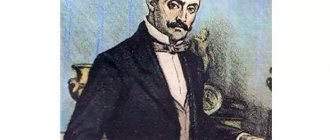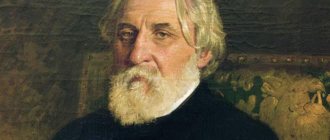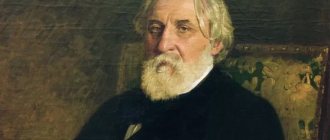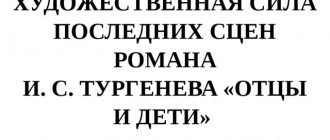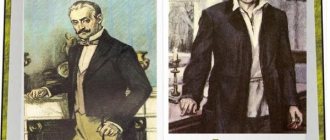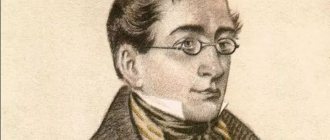Origin, education, social status
The father of Evgeny Vasilyevich Bazarov is a retired regimental doctor; with his service he earned the nobility. Mother is a poor noblewoman. They tried to ensure that their son had a good education. Evgeniy is studying at the university, studying natural sciences and medicine in order to become a doctor.
Pavel Petrovich Kirsanov, unlike the commoner Bazarov, was from a noble family, his father was a military general in 1812, and his mother was a real “mother commander.” Pavel's parents raised him at first at home, and then sent him to the page corps. After leaving this corps, he entered military service and became an officer, but did not serve in the military for long. He left both the service and secular society and now lives on his brother’s estate.
Portraits of heroes: description of appearance, behavior, characteristics of speech
Evgeny Bazarov is a young, tall man with a long, thin face, whose expression showed self-confidence and intelligence. He has large greenish eyes, thin lips, and a wide forehead. The hair was dark blond, thick and long, did not hide the bulges of the skull, and there were sandy sideburns on the cheeks.
With people, even when visiting, Bazarov does not behave very politely. Pavel Petrovich did not like the fact that Evgeny answered him reluctantly and that at the same time “there was something rude, almost impudent in the sound of his voice.” He spoke mainly only to the point, because he did not like to talk about abstract topics.
Pavel Petrovich Kirsanov looks about 45 years old. His whole appearance, thoroughbred and graceful, “retained youthful harmony.” Since childhood he had been distinguished by his beauty, and now his face bore traces of this remarkable beauty. His gray, cropped hair “shone with a dark sheen.” Pavel Petrovich spoke in a pleasant voice, had aristocratic manners, was exquisitely polite, and even dressed smartly in the village.
Views on life, society, people
Bazarov believes that the time has come for efficient people, that the time of romantics has passed. Bazarov’s nihilistic views are that he categorically does not recognize old truths, for him no one is an authority. He believes that first it is necessary to “clear the place” and only then can it be possible to build a new life. Bazarov despises aristocratic society, since it is inactive and does not bring any benefit for social development and for the people. Bazarov is proud of his closeness with the people. He proudly says to Pavel Petrovich: “My grandfather plowed the land.” Evgeniy thinks that he understands the people, but the men talked to him condescendingly, believing that the master just wanted to chat and that he did not understand anything in their lives. Bazarov believes that the people “deserve contempt” for their backwardness.
Pavel Petrovich Kirsanov is the main antagonist of Bazarov. He believes that only empty or immoral people live without principles and rules, and does not agree with Evgeniy that “at the present time, the most useful thing is to deny” art, poetry, and feelings. He also does not agree with the fact that the nihilists know the Russian people. Pavel Petrovich respects the Russian people, considers them patriarchal, sacredly honoring traditions.
About the “deep people”
This expression, “deep people”, comes from Dmitry Bykov’s science fiction novel “ZhD”. The deep people are the population, autochthons, busy with their lives, and not solving world problems that are preoccupied with the intellectual elite - both conventionally globalist and conventionally patriotic.
So, in “Fathers and Sons” a really very important problem is posed (and not solved): are different classes (stratas, parties, etc.) able to understand each other, are they even able to speak the same language? In relation to the era of “Fathers and Sons”, these are nobles and peasants; in relation to our realities, these are conditional hipsters and conditional gopniks. Since both of them make up the people, without mutual understanding between them, without reasonable compromises, the people are doomed to waste their energy. But is such mutual understanding possible?
Still from the film "Fathers and Sons". 1958
Here is Bazarov. In a conversation with Arkady, he reproaches his father, Nikolai Petrovich Kirsanov, that he does not understand the Russian peasant: “And good peasants will certainly deceive your father. You know the saying: “The Russian man will eat God.” At the same time, Bazarov himself, it would seem, understands the peasant and sees through him, the author tells us about this: “The servants also became attached to him, although he made fun of them: they felt that he was still their brother, not a master.” How is this understanding expressed? The fact that the yard boys willingly help him catch frogs for experiments, the fact that the maid Dunyasha has her eyes on him.
But now Bazarov is trying to seduce his serf father into an argument about the fate of Russia. And... “Alas! shrugging his shoulder contemptuously, knowing how to talk to the peasants, Bazarov (as he boasted in a dispute with Pavel Petrovich), this self-confident Bazarov did not even suspect that in their eyes he was still something of a fool.”
So what? Is mutual understanding impossible? It seems to me that Bazarov’s mistake (if not stupidity) is that, when entering into communication with people, he ignores the context, ignores the social and cultural difference between them. So he pesters his father’s serf and demands from him an answer to the question: “Well,” he told him, “explain to me your views on life, brother: after all, in you, they say, all the strength and future of Russia, a new era will begin from you.” in history, you will give us both a real language and laws.” But for a peasant, these concepts - “epoch”, “history”, “future” - are alien, obscure, lordly. In addition, the man has been taught by centuries of collective experience that it is impossible to talk seriously with the master, that the master needs to be flattered and indulged: “... it is known, the master’s will, therefore you are our fathers. And the more strictly the master demands, the nicer it is to the peasant...” Well, how can you seriously talk to a man whose father you belong to as a thing and who will inherit you in due time? Who can tear you out in the stables at any moment? To put it hyperbolically, it’s the same as if in a Nazi concentration camp an SS intellectual would go into a barracks and start a conversation with the prisoners about poetry and philosophy.
Clever Bazarov, of course, doesn’t understand this. And he doesn’t understand, by the way, because he is aristocratic in his own way. His aristocracy is expressed in the fact that he automatically puts himself above the peasant, forces him to adapt to his system of concepts, imposes on him his own, as philosophers would say, discourse. How is this format of aristocracy better than what Pavel Petrovich Kirsanov defends?
But mutual understanding is possible - as proven by such figures in Russian history and literature as Nikolai Leskov, Vladimir Korolenko, Vladimir Gilyarovsky. To do this, you just need not to bend your fingers, not to look down on the common people, as well as not to deify them (I’m hinting at Platon Karataev from Leo Tolstoy’s “War and Peace”). We must know its problems, we must see its shortcomings, we must learn to isolate the universal from the social. But it is difficult and long.
In our modern Russian society there is exactly the same problem. One part of society calls the other “vatniks” and “anchovies”, the other calls the first “fifth column” and “liberals”, and neither one nor the other wants to see people who are socially and culturally alien to them as people who have the same image of God , which is also in you.
Attitude towards love
Bazarov and Pavel Petrovich's views on love are different. Eugene was “a great hunter of women and female beauty.” He did not take them seriously, regarding them as a subject of anatomy.
Eugene considered romantic love a feigned feeling, “nonsense,” “nonsense.” He considered knightly feelings to be something like a disease or deformity. But these beliefs of his turned out to be unfounded. Having fallen in love with Odintsova, Bazarov was indignant at himself for treating her like a romantic, but he could not overcome this feeling within himself. Before his death, he realized that life is stronger than any theories, and confessed his love to Odintsova.
Pavel Petrovich, unlike Bazarov, having fallen in love with Princess R., did not resist his love and dedicated his life to her. It was as if he was bewitched by this strange, beautiful woman. When she stopped loving him, his life became empty. Pavel Petrovich could not forget his beloved and closed his soul to other women.
Characters: similarities and differences
Despite the fact that Pavel Petrovich Kirsanov is Bazarov’s antagonist in his views on life, there are some similarities in their characters. Both of them are honest, proud, self-loving people. Despite their different attitudes towards women and love, both heroes are similar in that they are not romantics.
Turgenev writes about the elder Kirsanov: “He was not born a romantic, and his foppishly dry and passionate, misanthropic soul, in the French way, did not know how to dream…” (Chapter XI).
The main difference between Bazarov and Pavel Petrovich (besides their views on life and society) is that Pavel Petrovich’s life is empty, he is not engaged in any useful activity. Bazarov is energetic and very active.
Evgeny Bazarov – hero of our time
Thus, it is obvious that although the hero is too straightforward and even slightly rude, he is still a kind and caring person and has a certain inner charisma. His main advantage lies in how sincerely Bazarov shows his attitude towards the people around him. He does not strive to please everyone around him, does not stick out his progressive views, does not shout at every corner about far-reaching plans, although they really are, because with the help of materialism Evgeniy strives to make the world a better place, to make everyone happy. He devotedly loves his parents and tries to achieve everything in life on his own. It is these traits that make him a positive character in the novel and allow him to be classified even as a hero of our time.
Comparative characteristics of Evgeny Vasilyevich Bazarov and Pavel Petrovich Kirsanov (table)
| Comparison options | Evgeny Vasilievich Bazarov | Pavel Petrovich Kirsanov |
| Origin | The grandfather was a peasant, the father was a general doctor, the mother was a noblewoman. Nobility was not passed down through the mother's side. The father received the right to nobility for his service and became a nobleman after the birth of Eugene. The author does not say whether Eugene, at the request of his father, also became a nobleman. Bazarov himself speaks about the nobles as if he has nothing to do with them. So, most likely, Bazarov is a commoner. | Hereditary nobleman, son of a military general in 1812. |
| Social status | University student, studying at the Faculty of Medicine. | Retired officer, aristocrat. |
| Portrait | A tall young man with long dark blond hair and drooping sideburns. The eyes are large, greenish, lips are thin. Wears a long robe with tassels. | A slender, graceful, handsome man of about 45. His gray hair “shone with a dark sheen.” He dressed smartly even in the village. |
| Speech characteristics | He spoke in a lazy, careless, manly voice. His speeches were uncomplicated and fragmentary, since he did not like to talk about abstract topics, preferring to talk to the point. | The voice is pleasant, the speech is polite, exquisitely courteous. |
| Behavior | Not very polite even when visiting. | Aristocratic. |
| Lifestyle | He studies, studies nature, and engages in physical and chemical experiments. | Inactive, leads an idle lifestyle. |
| Views | Democrat and realist. Nihilist (denies authorities, old truths and orders), materialist, cynic. | Liberal and idealist, esthete, appreciates authoritative opinions. |
| Attitudes towards women and love | In the first half of the novel, the attitude is soulless, consumerist. Considers women as objects of anatomy. He considered romantic love “nonsense.” Having fallen in love with Odintsova, I wanted to tear this love out of my heart. | Treats women with respect. Loved once in my life; after his beloved broke off relations with him, he closed his soul to other women. |
| Relationship to each other | Treats Pavel Petrovich with contempt. | He hates Bazarov. |
| General Character Traits | Pride, pride, honesty, lack of dreams. | |
The image of Bazarov. Characteristics of the main character
Analysis of the novel by I.S. Turgenev "Fathers and Sons"
Bazarov's inner world and its external manifestations. Turgenev paints a detailed portrait of the hero upon his first appearance. But strange thing! The reader almost immediately forgets individual facial features and is hardly ready to describe them after two pages. The general outline remains in the memory - the author imagines the hero’s face as repulsively ugly, colorless in color and defiantly irregular in sculptural modeling. But he immediately separates the facial features from their captivating expression (“It was enlivened by a calm smile and expressed self-confidence and intelligence”).
The first thing that catches your eye in Bazarov’s behavior can be interpreted as a manifestation of self-confidence. He is distinguished by a certain rudeness of behavior, an unwillingness to follow the rules of good manners and even basic standards of decency. His behavior contrasts with the sincere, affable manner of the good-natured Nikolai Petrovich, the exquisite, coldish courtesy of his brother, or the enthusiastic verbosity of Arkady. Here the hero meets his friend’s father, the future owner of the house where he invites him to stay: “Nikolai Petrovich <...> squeezed his <...> hand”, Bazarov “immediately gave him his”, “answered kind questions in a lazy but courageous voice " The casual manner of communication he adopts extends to representatives of all classes. Here, at the inn, for the first time we become witnesses of Bazarov’s communication with the men. “Well, turn around, fat beard!” - Bazarov turned to the coachman. However, this apt, rude description did not offend the men at all: “Listen, Mityukha,” picked up another driver standing right there <...>, “what did the master call you? Thickbeard is."
Those around him are attracted by Bazarov’s stern simplicity more than by Pavel Petrovich’s aristocratic courtesy, from which, as Fenechka aptly remarks, “it will give you the cold.” Nikolai Petrovich, although “afraid of the young nihilist,” nevertheless “readily listened to him, willingly attended his physical and chemical experiments.” The servants “attached” to him, not excluding Peter, who was limited in complacency. Bazarov is followed “like little dogs” by peasant children. He also became friends with Fenechka. At first, the young nihilist allowed himself an ironic remark addressed to Nikolai Petrovich. But when he approached the shy Fenechka, he behaved with all courtesy. “Allow me to introduce myself,” he began with a polite bow, “Arkady Nikolaevich is a friend and a humble person.” The stern doctor unmistakably touched a weak string in the mother’s heart - he showed attention to her child. Even little Mitya recognized Bazarov’s charm: “Children feel who loves them.” Subsequently, Bazarov more than once, as a doctor, will come to Mitya’s aid. And all this with constant jokes and banter. Behind this lies a desire so that Fenechka does not feel obligated to him. Here, in this house, Fenechka, an unofficial wife and mother of an illegitimate child, sometimes has a hard time already - Bazarov understands this. On a human level, he sympathizes with Fenechka, but prefers not to interfere in a difficult family situation. “She’s a mother—well, she’s right.”
Household members, servants, children - all of them are truly interesting to him as a human being. And he himself is an interesting personality, which irresistibly attracts people of all classes. Arkady imitates Bazarov in the artless simplicity of his behavior. It turns out, however, that being simple and democratic with everyone is very difficult. For Arkady, this comes out deliberately, and despite all the sincerity of his intentions, it is unnatural. He wants to meet Fenechka and without warning goes to her room. Left in the living room with his heart beating, it occurs to the father “that Arkady would have shown him almost more respect if he had not touched this matter at all.” Arkady was delighted to meet his stepmother and the presence of his little brother in the world. But behind the impulse of generosity hides an arrogance hidden from oneself. Secretly, the young man admires the breadth of his own views. It doesn’t occur to Arkady that such generosity humiliates his father, even though he is pleased with the sincerity of his eldest son’s feelings. About the ensuing scene of a kindred embrace, the author notes: “...There are touching situations from which you still want to get out of it as soon as possible.”
There is a gradation in the rudely uninhibited manners of Kirsanov’s guest. In some cases they mask subtle delicacy, as with Fenechka. In others, they are an open response to disguised rudeness. So on the day of his arrival, he “took off” after Arkady, even though he had no intention of leaving for a minute. But he preferred an unceremonious departure to pointed ignorance on the part of Pavel Petrovich (“I didn’t offer my hand <...>, I put it back in my pocket”). Later we see how Bazarov’s external severity helps him hide his inner embarrassment and even timidity (in his relationship with Anna Sergeevna). In any case, the author interprets Bazarov’s behavior to us not only as a feature of his character, but also as a national feature. “The only good thing about a Russian person is that he has a very bad opinion of himself,” Bazarov casually but meaningfully drops in a conversation with Arkady.
Another feature of Bazarov, which cannot but arouse respect for him, is “a noble habit of work.” This is the organic impossibility of an idle existence. It is noted that Bazarov woke up “earlier than anyone else” in the Kirsanovs’ house the next day after a tiring journey. When “about two weeks” had passed since his arrival, as a matter of course, the author says: “Life in Maryino went on in its own order: Arkady was sybaritizing, Bazarov was working.” Carrying out scientific experiments and observations, the hero is not afraid to get his hands dirty: “His linen coat and trousers were stained with mud; a tenacious marsh plant entwined the crown of his old round hat...”
The “enlightened mind” becomes the support for innate hard work. With knowledge of the matter, Bazarov “explains” to his friend which trees, based on the state of the soil, should be planted in the garden instead of the dead oaks. “In a few minutes” he penetrated into the weak points of Nikolai Petrovich’s economy. In everything related to applied, experimental, scientific knowledge, Bazarov shows broad education, observation and intelligence. At the same time, knowledge was not easy for him. The son of a doctor, the owner of a village and twenty-two souls of peasants probably had a more difficult time than his friend. Subsequently, Bazarov’s father proudly reveals to Arkady a family secret: “...If someone else in his place would have pulled and pulled from his parents; and with us, believe me? He never took an extra penny!..” Absolute selflessness, a man’s desire to rely solely on his own strengths distinguishes Bazarov. “...The Rudins have knowledge without will; the Bazarovs have both knowledge and will...” – the critic rightly pointed out. With good reason, one can apply to Bazarov the definition that Rudin did not receive - “a genius.”
It was the writer’s task to show his human attractiveness in the hero. “The “contemporary” will probably shower me with contempt for Bazarov,” he wrote in his diary, “and will not believe that during the entire time of writing I felt an involuntary attraction to him.” In one of his letters, Turgenev directly stated: “...If the reader does not fall in love with Bazarov with all his rudeness, heartlessness, ruthless dryness and harshness <...> - I am guilty and have not achieved my goal.”
But as in the case of Rudin, the dissonant notes in the hero’s appearance are becoming increasingly stronger. “Thought and deed merge into one,” the radical critic D.I. wrote with delight about Bazarov. Pisarev. No sooner said than done. Bazarov noticed the “disorder” - the owner of the house, Nikolai Petrovich, “He’s reading Pushkin <…>. This is no good. After all, he’s not a boy: it’s time to give up this nonsense.” Bazarov recognizes “something practical” as useful reading. And on the same day, Arkady “silently, with such gentle regret on his face,” “like a child,” took the ill-fated book from his father. Instead, on the advice of a friend, I “placed” a brochure by a German naturalist. Stop... We see how in Bazarov’s nature, at first glance, open, simple and whole, aspirations appear that the moral feeling cannot accept. And they arise as a kind of continuation of attractive traits. We said that Bazarov’s charm attracts everyone with whom life encounters him. A few days after his arrival, he is already the focus of interest at home. The hero knows this and uses it, forcing those around him to live as he sees fit. External simplicity hides the need to skillfully manipulate others. After all, he didn’t take the book himself from the owner of the house, but pushed his friend to do this, knowing that Arkady would be happy to demonstrate his open-mindedness, and Nikolai Petrovich would not object to his son. But, subordinating the interests of others, Bazarov considers himself free from all the responsibilities of the hostel. Turgenev makes us witnesses how the hero violates all the rules of hospitality, respect for elders and even moral norms. In the same episode with the book, Bazarov’s actions clearly lead to a quarrel between father and son. The guest allows himself rude attacks against Uncle Arkady, in his presence and behind his back. The attentive reader will notice that this is done demonstratively. The hero is obviously convinced that he has every right to do this. But what about his democracy, his intelligence, which in our eyes is inherent in a person engaged in science?
The simpler and more democratic Bazarov behaves, the more sharply his dissimilarity from those around him appears. It is clear to anyone that this is an extraordinary person. Odintsova, to whom he introduces himself as a “future district doctor,” objected with liveliness: “You yourself don’t believe this <...>. Is it possible for you to be satisfied with such modest activity <...>!” Bazarov’s father, Vasily Ivanovich, asks Arkady: “... After all, he will not achieve <...> fame in the medical field?..”
- Of course, not in medicine, although in this regard he will be one of the first scientists.
- Which <...>?
“It’s hard to say now, but he will be famous.”
Does Bazarov know what hopes are placed on him? He knows. Bazarov casually reminds Arkady that he is the “grandson of a sexton.” And he adds: “Like Speransky.” Mikhail Mikhailovich Speransky (1772–1839), born into a poor spiritual family, thanks solely to his intelligence and talents, made a dizzying career - to count and minister of the court. Speransky was the closest adviser to two emperors - Alexander I and Nicholas I. Irritated by his independent character, frightened by the radicalism of the proposed reforms, Alexander sent Speransky into exile. Subsequently, Nicholas, who was claiming the throne, and the Decembrists agreed on one thing - the future government could not manage without Speransky’s experience and knowledge...
A comparison thrown as if by the way reveals to us the boundaries of Bazarov’s ambition. He is obviously preparing himself for the future of a statesman. The only difference is that Speransky agreed to climb the steps of the existing social ladder. Bazarov is a nihilist. A special episode is devoted to an explanation of this social term and its meaning in the novel. Bazarov does not participate in it, although it is primarily about him. Arkady “with a grin” (how can one not know such simple things!) explains to his father and uncle: “... This word means a person who...” “Who does not recognize anything?” - Nikolai Petrovich guesses. Pavel Petrovich strengthens the negative connotation of the meaning of “nihil” - “nothing”: “...Who does not respect anything.” But this turns out to be too weak. “Who treats everything from a critical point of view...” “A nihilist,” Arkady formulates, clearly from Bazarov’s words, “is a person who does not bow to any authority, who does not take a single principle for granted, no matter how respectful he may be.” principle". But this definition does not sufficiently reflect Bazarov’s radicalism. It is not without reason that the most common verbs in the speeches of young people are “not to believe,” “to deny,” “to break,” and “to destroy.” “First we need to clear the place,” Bazarov says about the task of himself and his like-minded people. “Turgenev’s hero rejects <...>really everything - all really existing forms of social structure, economic life, culture, everyday life and even the psychology of people <...>. Russia is in a dead end, from which there is no way out <…>. The existing world must be destroyed completely, to the ground..."
Bazarov, as a statesman, thinks in all-Russian categories. We have little doubt that he is ready to take on national responsibilities. For now, his weapon is science. Natural science knowledge is useful not only as a means of revealing the secrets of nature and helping a suffering person. The main opponent of nihilism, the critic and writer Mikhail Nikiforovich Katkov, was the first to understand this: “He is engaged in these sciences (natural) because, in his opinion, they directly lead to the solution of questions about these first causes <...> a tool for the destruction of prejudices and for admonishing people." “To enlighten people,” Bazarov is convinced, the book of German materialists is most suitable. No wonder he almost forces the unreasonable Nikolai Petrovich to read Buchner’s popular pamphlet. Ludwig Büchner (1824–1899) – German doctor, naturalist and philosopher, convinced materialist. He was one of the propagandists of the theory of “social Darwinism.” It was proposed to transfer Charles Darwin’s discoveries in the field of natural sciences to the structure of human society: the principles of natural selection, the struggle for existence, the survival of the fittest as determining factors of social life. “The Germans are our teachers in this,” Bazarov says with gratitude.
But he goes further than his teachers. The Russian nihilist is inclined to interpret the title of Buchner’s brochure “Matter and Force”, omitting one letter, as “Matter - Force”. Everything that is intangible, that cannot be touched, measured, tested experimentally, is a prejudice. Culture, art, the power of nature, respect for the elderly - these are prejudices that must be destroyed in the name of the common good. Bazarov the nihilist offers this as a scientist and as a public figure. The scientist Bazarov doubts the existence of these unreal concepts. The leader of the Bazaars denies their need, based on their belonging to the old world. The old world is bad - is it not the fault of culture? If he is to be swept away, his attributes will inevitably fall. This is what the “hero of his time” thinks. But there is also Bazarov, a man who should be familiar with feelings and experiences?
“The religion of denial is directed against all authorities, and itself is based on the crudest worship of authority <...> it has its own merciless idols,” the same Katkov venomously noted. The youth of the 1860s, contemporaries of Chernyshevsky, Dobrolyubov, Pisarev, built their lives according to strict laws, deliberate, developed by reading books and conversations with friends. It is not for nothing that the word “principles” sounds harsh, rude, and categorical from their lips. And if for the sake of ideas it is necessary to abandon previous attachments, to step over feelings - well, it’s not scary. The hero proudly calls himself “self-made.” Subsequently, Bazarov will tell his friend that to succumb to feelings for him means to “fall apart.” In return, they are given the proud consciousness that they themselves, from beginning to end, build their own destiny: “Upbringing? ...Every person must educate himself - well, at least like me, for example <...>. As for time, why will I depend on it? It’s better to let it depend on me.”
It is important for the author that Bazarov is precisely a Russian person, who, even in his extremes, was the embodiment of typical traits of national character. It was not for nothing that Ivan Sergeevich saw in him a “pendant” (parallel) to the national hero, the rebel Pugachev. Even in “Notes of a Hunter,” Turgenev noted that “the Russian man is so confident in his strength and strength that he is not averse to breaking himself: he pays little attention to his past and boldly looks forward. What <...> is reasonable - give him that, but where it comes from - he doesn’t care.” Then the writer was inclined to evaluate this quality as unconditionally positive. But having encountered the philosophy and practice of nihilism, I was alarmed. After all, the goals of nihilism are sublime and beautiful - the happiness of humanity. But is it not too much to give up in the name of “reasonable”? First of all, enter into battle with your own soul, as the main character does throughout the novel. This is largely why Bazarov for his creator is a “tragic”, “wild”, “gloomy” figure.
►
Conclusion
In I. S. Turgenev’s novel “Fathers and Sons” the characters’ completely opposite views on life, society, people and human feelings are presented. A comparative description of Evgeny Vasilyevich Bazarov and Pavel Petrovich Kirsanov helps to reveal the essence of the images of these prominent representatives of nihilism and liberalism. The image of the main character of the novel “Fathers and Sons,” Evgeniy Bazarov, is more fully revealed when compared with his main opponent in the debate, Pavel Petrovich Kirsanov.
“What I accept and do not accept in the character and actions of Evgeny Bazarov”
Roman I.S. Turgenev's "Fathers and Sons" was published in 1862, and in it the author reflected the main conflict that split Russian society on the eve of the era of reforms. This is a conflict between common democrats who advocate decisive reforms, and liberals who prefer the path of gradual reforms. Turgenev himself belonged to the second camp, but he made the hero of the novel his ideological opponent, a commoner by birth and a nihilist by views, Evgeniy Bazarov.
Our first meeting with the hero takes place on May 20, 1859, when Arkady Kirsanov, returning after graduation to his native “nest of nobility,” brings with him his new friend, Bazarov. The figure of Bazarov immediately attracts our attention: one can feel inner strength, calm confidence, independence in views, actions, and judgments. He undoubtedly had a strong influence on Arkady. Turgenev draws the reader’s attention to Bazarov’s careless manners, to his clothes, “a robe with tassels,” which the hero himself calls “clothes,” to his naked red hand, which obviously did not know white gloves and was accustomed to work. The author draws a portrait of the hero: we see his long and thin face with a wide forehead, “it was enlivened by a calm smile and expressed self-confidence and intelligence.” Bazarov was studying to become a doctor and next year he was going to “become a doctor.”
Bazarov's main subject of interest is natural sciences. He had deep and broad knowledge in physics, chemistry, biology, and medicine. He, as Arkady puts it, “knows everything.” But, as we soon see, Bazarov’s knowledge was somewhat one-sided. The hero recognized only those sciences that brought visible practical benefit. Therefore, Bazarov admired the natural sciences and did not recognize philosophy or art at all. He said: “And what is science - science in general? There are sciences, just as there are crafts, knowledge, but science in general does not exist at all.”
This narrow-mindedness is explained by Bazarov’s beliefs. He calls himself a “nihilist,” that is, a person who “does not bow to any authority, who does not accept a single principle on faith, no matter how respected this principle may be.” Bazarov believes only in what can be verified by experience, experiment. He denies the usefulness of literature, painting, music, and art in general for humans, because, as it seems to him, they do not bring practical benefit. “A decent chemist is twenty times more useful than any poet,” says Bazarov. “Raphael is not worth a penny.” Turgenev's hero does not understand that art is as important for a person as practical sciences.
No wonder there is a wise Russian proverb: “Man does not live by bread alone.” These views of Bazarov undoubtedly impoverish him as a person, and we cannot accept them. In this regard, the image of Nikolai Petrovich Kirsanov, who knows how to subtly feel and understand beauty, seems more sympathetic to me: he loves Pushkin, enthusiastically plays the cello, and admires the beauty of Russian nature. Bazarov is indifferent to the beauty of nature, but looks at it purely practically. “Nature is not a temple, but a workshop, and man is a worker in it,” he says. But there are also positive aspects to Bazarov’s views - this is the denial of outdated concepts and ideas. First of all, this applies to his views on the nobility and, in particular, on the aristocracy. Bazarov always underlines. nodded his non-noble origins, although his mother comes from impoverished nobles and his parents even have their own small estate and eleven serfs. The hero is proud of his closeness to the people, he even introduces himself in the folk way - Evgeny Vasiliev. “My grandfather plowed the land,” says Bazarov.
He was accustomed to working since childhood, studied with “copper money,” supported himself, and did not take a penny from his parents. Great hard work, efficiency, perseverance, willpower and practicality - these are the qualities that Bazarov can deservedly be proud of and that attract us to Bazarov. He constantly works: he conducts experiments, “cuts frogs,” and is engaged in medical practice. These activities of Bazarov sharply contrast with the “sybaritism” of Arkady and the aristocratic idleness of Pavel Petrovich, whom Bazarov sincerely despises and considers a worthless person.
But not all of Eugene’s actions evoke our sympathy. We cannot approve of his feelings for his parents, whom he treats somewhat arrogantly and condescendingly and to whom he unwittingly causes pain. But they love him so sincerely, they are so proud of him! Bazarov's attitude towards Arkady can also not always be called comradely. Evgeniy sometimes seems rude and insensitive. But behind this external rudeness hides a tender, vulnerable heart, capable of deep feeling. Although Bazarov denies the feeling of love, he himself is capable of deep and sincere love. This proves his attitude towards Anna Sergeevna Odintsova. It is her who the dying Bazarov asks to call to him so that he can see him again before his death.
The death of Bazarov, so truthfully depicted in the novel, makes a strong impression on us. Turgenev himself considered Bazarov a tragic figure, because, according to the author, he had no future. DI. Pisarev in the article “Bazarov” wrote: “Not being able to show us how Bazarov lives and acts, Turgenev showed us” how he dies... To die the way Bazarov died is the same as to accomplish a great feat.” The hero dies without renouncing his views, his beliefs, without betraying himself. And the tragic death of Bazarov is the final chord of his short but bright life.
The personality of Evgeny Bazarov, his views, actions, of course, are ambiguous; we can accept them or not. But they are undoubtedly worthy of our respect.
